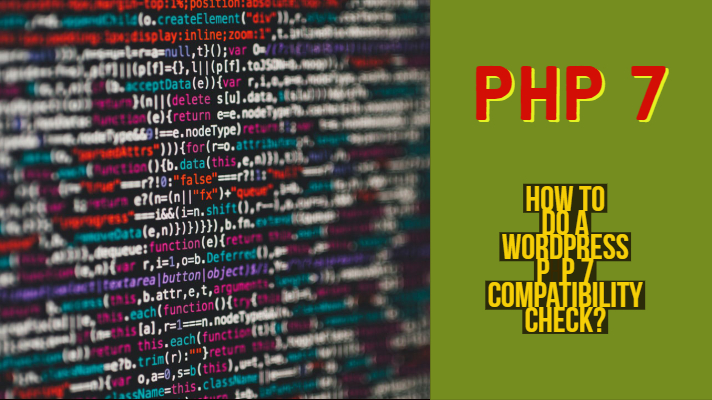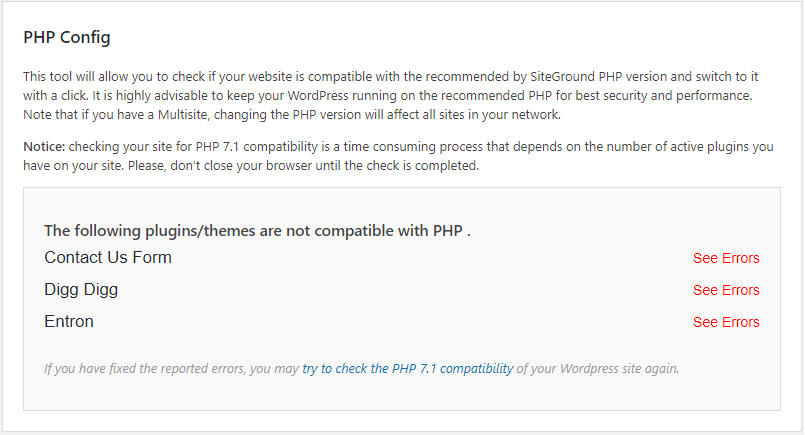
Wondering how to do a WordPress PHP 7 Compatibility Check? Read to know how.
PHP version 7 is undoubtedly the best thing that has ever happened to WordPress. Of course, WordPress has always been working on PHP, but the latest version of the PHP has made your WordPress installation work faster and efficient. However, running your themes and plugins will need you to check their compatibility with PHP 7. Why would you need you to check for the PHP 7 compatibility and how will you do it? Let us check out through this tutorial.
Why Do You Need To Check Compatibility?
PHP 7 is indeed a powerful and a more secure option you have for the proper functioning of your site. However, you should take a few precautions, given the fact that it is a fundamental change for your website.
Your host may not allow you to update yourself to PHP 7 easily. Upgrading to newer versions would necessarily mean having access to backups and the possibility to revert changes if needed. If the themes and plugins are not compatible with PHP 7, you may need to change the hosts.
Upgrade to SiteGound for PHP 7 Hosting
WordPress PHP 7 Compatibility Check
If you are planning to check the compatibility of your plugins and themes with PHP, there are a few ways you can employ. Of course, prime among them should be the PHP Compatibility Checker from WP Engine. You may also opt for other options for your needs, though.
Use PHP Compatibility Checker
Well, PHP Compatibility Checker is a utility designed by WP Engine. You need to install it on your WordPress site, and it lets you know which version of the PHP that your site is compatible with. The PHP 7 is the latest version of the PHP environment and offers you excellent performance compared to the previous versions. But, before you can upgrade to the newest version, it would be essential to check whether the latest version is compatible with the release.
Here are the steps you can use to check compatibility with the PHP Compatibility Checker.
- Login to your WordPress account
- Install the PHP Compatibility Checker
- Activate the Plugin
- From the menu on the left, look for Tools and expand it.
- Choose the PHP Compatibility.
- In the scan options, you can choose the PHP version of that you would want to check the compatibility for.
- Now choose the plugins and themes you want to scan for. You can select any particular plugin and theme or choose to examine all of them together.
- Now, click on Scan Site.
Once the scan is done, you can either review the scan results or download the report for careful analysis.
Is PHP Compatibility Checker A Complete Solution?
Well, the PHP Compatibility Checker is indeed the best option for checking the compatibility of your existing plugins and themes with the chosen version of the PHP. However, there are a few issues that can affect the functionality of the plugin.
For the starters, the PHP Compatibility Checker is a plugin that can scan the code for the plugins and themes. It will not be able to check the Runtime compatibility. The checker does not run the code but analyzes the code, based on the database of code repository through CodeSniper. It will only check whether the code is compatible or not. It cannot ascertain whether the system will work.
Any Other Options to check PHP Compatibility?
Well, as we already found out, PHP Compatibility Checker an ideal solution to check the compatibility of your existing themes and plugins with the PHP 7. However, as we found already the plugin has a few issues or caveats. Which other options can you opt for if you are checking out the compatibility of the plugins and themes?
If you are using Sitegound’s awesome WordPress Hosting, then you could use SG Optimizer plugin to check for PHP 7 compatibility. However, it is important to note that this plugin is designed to link “WordPress with the SiteGround Performance services.” It WILL NOT WORK on any other hosting service provider.

One of the best options is to opt for the test environment. Now, what does a test environment mean? Well, you will run the site on PHP7 in a temporary pre-production environment! Yes, you will not activate the new version of PHP, but run it for a shorter period and check if it works effectively across all your plugins and themes.
Several hosting services help you do it. This functionality is generally referred to as Staging. Staging should ideally be what would let you one-click PHP switching mechanism. The exact working of the feature would be to create a staging environment on your site, switch to PHP7, test it across multiple functionalities and work through it. Once you are satisfied with the feature, you can change the live site with PHP 7. Of course, the PHP Compatibility Checker also offers you a staging environment if you are attempting a check.
Another alternative that you may use for checking the PHP Compatibility would be to check it in a local environment. There are positive impacts of working in a local context. There are a few tools that would help you test the PHP 7 compatibility in a local environment.
In any case, upgrading to PHP 7 environment without checking for the compatibility can cause your website to get crippled – at least until the time that you would take to fix it.
The Concluding Thoughts
Well, PHP 7 is indeed a significant improvement on all the existing or previous versions. If you are on WordPress and want to make full use of PHP 7 on your site, it should be quite ideal to check out the options to upgrade to PHP 7. But, the first thing you need to focus on before you can migrate to PHP 7is to check the compatibility of your plugins and themes with the new update.
We assume that the tips and options we have featured above concerning checking the compatibility of your site to the PHP 7 environment should be helpful for you in arriving at the best solution. In any case, you should be aware that PHP 7 is just great, useful, faster and indeed a worthy upgrade. If your current system does not allow you to upgrade to PHP 7, it may be time to change your host. You can either opt for a new host or use the local environment for the purpose.